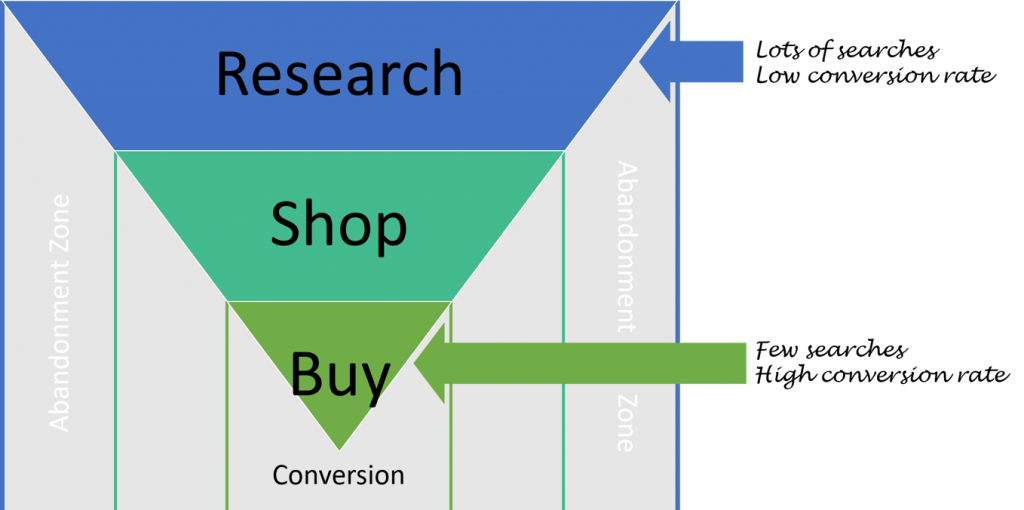
To the untrained eye, a keyword typed into the search bar at Google or Bing is just that: a keyword. But the shrewd marketer understands that every phrase used to produce a search is packed with meaning. Not only does the phrase tell you what the searcher is interested in, but it also gives you insight into the intent behind the search.
Understanding the former only helps us understand the topic of the search. It’s the latter that helps us produce content that meets the searcher’s true need and desire. Focusing only on the topic might get you good rankings, but it won’t get you good results. Focusing on keyword intent will not only help you achieve better search rankings, but it will also be significantly more effective in turning that searcher into a customer.
When it comes to the stages of the buying cycle, some stages get better conversions than others. That’s just the nature of the searcher’s intent. When they’re in the research phase, they’re less likely to convert. They have to perform enough research to gain the information they need to move fully into the “buy” phase.

The graphic above illustrates a general truth, regardless of what you do to focus on the keyword intent. However, when you do consider intent and optimize accordingly, you’ll see both your traffic and conversion rate numbers improve across the board.
Reading between the minds
When it comes to understanding the intent of any given keyword, you have to read between the lines minds of your audience. The first step is to truly try to put yourself into the head of the searcher. For every query, ask these questions:
- Are they wanting general information (research)?
- Are they focusing in on their topic (shop)?
- Are they seeking specifics (buy)?
All of which comes down to this one question: What does the searcher really want?
Generally speaking, the broader the phrase, the higher up the searcher is in the buying cycle. As phrases get more specific, the closer they move to the buying phase. Your goal is to anticipate their need and deliver it.
 “Generally speaking, the broader the phrase, the higher up the searcher is in the buying cycle. As phrases get more specific, the closer they move to the buying phase.” — Stoney deGeyter
“Generally speaking, the broader the phrase, the higher up the searcher is in the buying cycle. As phrases get more specific, the closer they move to the buying phase.” — Stoney deGeyter
 “Generally speaking, the broader the phrase, the higher up the searcher is in the buying cycle. As phrases get more specific, the closer they move to the buying phase.” — Stoney deGeyter
“Generally speaking, the broader the phrase, the higher up the searcher is in the buying cycle. As phrases get more specific, the closer they move to the buying phase.” — Stoney deGeyter When someone searches for a motorcycle battery, what are they looking for?
- A page that provides a product search for all motorcycle batteries?
- A list of batteries for a specific type of motorcycle?
- A specific battery?
Answer: 1 – A page that provides a product search for all motorcycle batteries.
Now, let’s do that again. This time, the search is for honda motorcycle battery.
Answer: 2 – A specific battery.
One more time. Search: 2013 honda goldwing replacement battery.
Answer: 3 – A list of batteries for a specific type of motorcycle
Notice how these follow the pattern of the buying cycle?
Now there’s one more category that we have to be aware of that I have not mentioned so far, and that is informational searches. These are performed by DIYers rather than shoppers. These phrases are often in the form of a question, but not always. But even the non-question variants are clearly informational searches. In order to fulfill the intent of these keywords, the searchers must be delivered to informational content rather than any type of sales content.
Ask Google
If all else fails and you just don’t know what the intent of any given keyword is, you can always ask Google. Perform the search for the keyword phrase in question and scan the results. Do a majority of the top ten results lead to pages that fit any of the four categories mentioned above? If so, then you have your winner.
Even if you think Google is wrong, don’t fight it. You’ll have little chance of breaking through search results if you’re trying to rank content that doesn’t fit with how Google interprets the phrase.
Concluding thoughts
Understanding the intent of any given search is critical to driving searchers to the content that they want. Failing to do so will not only hurt your conversion rates, but it will also make it that much harder to even get positioned in Google’s search results. However, when your optimization efforts focus on not just topics, but keyword intent as well, you have a greater chance of driving traffic and getting the conversions both you and the searcher are looking for.
